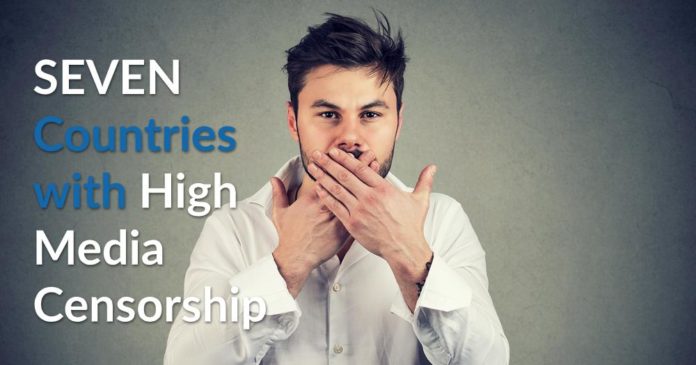
Freedom of the press is a noble idea that has caught on in the West and has even spread in many parts of the world on the heels of the collapse of the Soviet Union. However, it still has “room for growth,” with governments in some countries blocking efforts of journalists and regular people to freely express their opinion and even bare facts.
The advent of the internet allowed people to access all the information and news in the world until authoritarian governments upped their game. Today, some of these governments have sophisticated tech departments that are, unfortunately, blocking parts of the web they don’t like. Here are the top 7 countries with high media censorship, for which you’ll need a VPN to bypass their silly restrictions:
1. North Korea
There is no country in the world like North Korea. When it comes to any kind of freedoms, it is by far the most repressive place in the world. Nevertheless, you should be able to use a VPN when visiting Pyongyang (the country’s capital) if — and this is the tricky part — you can get internet access in the first place. Instead of censoring the internet, the local government took an additional step and banned the entire internet for the majority of the population. Those lucky enough who can surf the web will get a rather limited experience with little to no news websites loading up for them. And the same goes for social networks, YouTube and so on.
2. China
China also has a special place on the list due to its tech-savvy censors. Users in China are free to access the internet but not all of it. For instance, popular social networks like Facebook and Twitter are not available in the world’s most populous country and the same goes for YouTube, many news websites and so on. Also, because of the mentioned tech-savvy sensors, it is not easy to bypass what is commonly referred to as the Great Firewall of China. Not every VPN will get the job done and the government is putting an extraordinary effort to continuously shut down new VPN servers. Nevertheless, a few VPNs still work though you should install them on your device prior to landing in Beijing or wherever you happen to go. (Related: 5 Data Security Tips for Your Next Trip to China)
3. Saudi Arabia
The Saudi regime is well known for media censorship, relying on lax laws created under the premise of anti-terrorism and cybercrime prevention. Said laws allow the government to “legally” jail whistleblowers, journalists, social media users, and bloggers. The most infamous example of how things “work” in Saudi Arabia was the clandestine execution of Jamal Kashoggi, a Washington Post columnist, in October of 2018. So, if your travels lead you to Saudi Arabia, you should install a VPN before hitting the ground.
4. Iran
The situation is similar in Iran though there are slightly more freedoms here. The government wants you to believe that the press is free in the country, but the situation is very different on the ground. For start, foreign press is allowed in Iran, but it is closely monitored by government agencies. Also, journalists that deviate from the official narrative could be stalked and harassed, with regular users turning to the internet for access to the real news. There, however, the situation is similarly complicated with the government censors blocking popular social media sites and streaming platforms. Nonetheless, you can bypass these restrictions with a good VPN.
5. Belarus
Alexander Lukashenko, President of Belarus since 1994, instituted a law on mass media that gave the government a ton of power to regulate what people read, listen and watch in the former Soviet republic. Said law includes restrictions on the propagation of “fake news”, intentionally leaving a lot of room on the definition of what constitutes fake news. And that room makes it possible for the country’s censors to forbid access to certain websites and services, and — of course — control the “offline media.”
6. Cuba
Even though the Soviet Union dissolved in 1991, Cuba kept communist practices of watching every step its constituents make. So it extended information control from offline to online, making it hard to access Facebook, Twitter and many news websites from the island nation. For start, the government makes it difficult for the majority of citizens to connect to the internet. Even today, getting online is an expensive luxury for many citizens who, in turn, are forced to read the government’s press releases in newspapers, listen to them on the radio and watch on their TVs.
7. Vietnam
Another communist country on the list that aims to control all information its constituents have access to. All Vietnamese journalists must be approved by the (communist) party, whereas journalists from outside of Vietnam are required to be supervised by the government. This “powerful combo” ensures what the party thinks will ensure the stability of its regime. Add occasional jailing of journalists to the mix and you get a place where people have to turn to VPNs in order to access real news and learn what’s going on in their own cities and towns.
…
Other “worthy” contenders in this list include Eritrea, Turkmenistan, and Equatorial Guinea; though the situation is changing for the worse in Turkey and Russia, as well.
People living/working in or traveling to the countries mentioned above are advised to install a VPN app on all their devices just to be able to access the sites they got accustomed to. Also, a VPN will keep their connections that much more secure.
We have checked a few dozen VPNs so you don’t have to. Here you can find a VPN for most popular countries as well as VPNs for many activities like streaming, torrenting and so on. We’re sure, you’ll find a service that is best suited for your unique needs.
